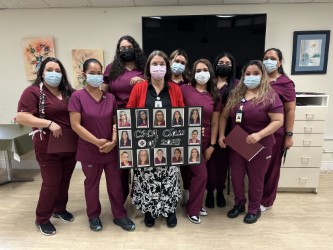4 Health Conditions Men Shouldn't Ignore
- Category: Health & Wellness
- Posted On:
- Written By: Lompoc Valley Medical Center

Though it’s not a statistic anyone wants to hear, the stark truth is that on average, men die about five years earlier than women.
Men also have higher mortality rates from some cancers and heart disease, according to the Centers for Disease Control and Prevention.
During Men’s Health Month in June, LVMC encourages men to speak with their healthcare providers about age-appropriate preventative medical tests and activities they may start doing in order to stay healthy.
There are many medical and health issues of particular concern to men, and worth talking about with a physician during an annual check-up:
- Muscular Dystrophy: Muscular Dystrophy is a group of more than 30 genetic diseases characterized by muscle weakness and muscle loss that progressively weaken. The various types of MD affect more than 50,000 Americans. Some common pediatric forms are more prevalent in boys, with Duchenne muscular dystrophy affecting only males. Duchenne typically surfaces between the ages of 2 and 6, and life expectancy is usually into the teens and early 20s.
- FXTAS: Though less well-known than muscular dystrophy, a late-onset condition called Fragile X-associated Tremor and Ataxia Syndrome, or FXTAS, usually occurs in males after the age of 50. Those with the syndrome typically have balance problems, and symptoms similar to Parkinson’s disease, including memory loss and muscle stiffness.
- Testicular Cancer: This type of cancer is most often diagnosed in men between the ages of 20-34. It most often begins in the cells that make sperm. It can usually be cured, even if discovered at a late stage. Men may find evidence of testicular cancer while performing a self-examination. Many physicians recommend men ages 15-55 perform a monthly self-exam to determine if there have been any chances – very much like a female breast exam for breast cancer signs. Men should contact their physician if they find a lump, hardness, pain, enlargement or any other change in either one or both testicles.
- Depression: According to the National Institute of Mental Health, men who are depressed may appear to be angry or aggressive, rather than sad. Family and friends may not recognize that as being depressed, and typically men are less willing than women to talk about or seek help for depression. Men with depression may also lose interest in work, family or hobbies. Sometimes physical changes such as racing heart, headaches or digestive issues may be signs of distress. There are many options for help, including for those with immediate crisis needs. The toll-free National Suicide Prevention Lifeline at 1-800-273-8255 is available 24 hours a day. The Substance Abuse and Mental Health Services Administration (SAMHSA) Treatment Referral Helpline at 1-800-662-HELP (4357) can assist in finding treatment options as well.
Most healthcare providers will attest that men need to pay more attention to their health. Men are more likely to put off regular checkups or seek medical help; they tend to be drink and smoke more than women and on average make more risky lifestyle choices than their female counterparts.
Men’s Health Month is the time to pay attention to what you may have been putting off – get screened for age-related medical issues like cholesterol, blood pressure, and diabetes; make changes to enjoy a healthy lifestyle; update your vaccinations; get your teeth and eyes checked and schedule an annual physical.






